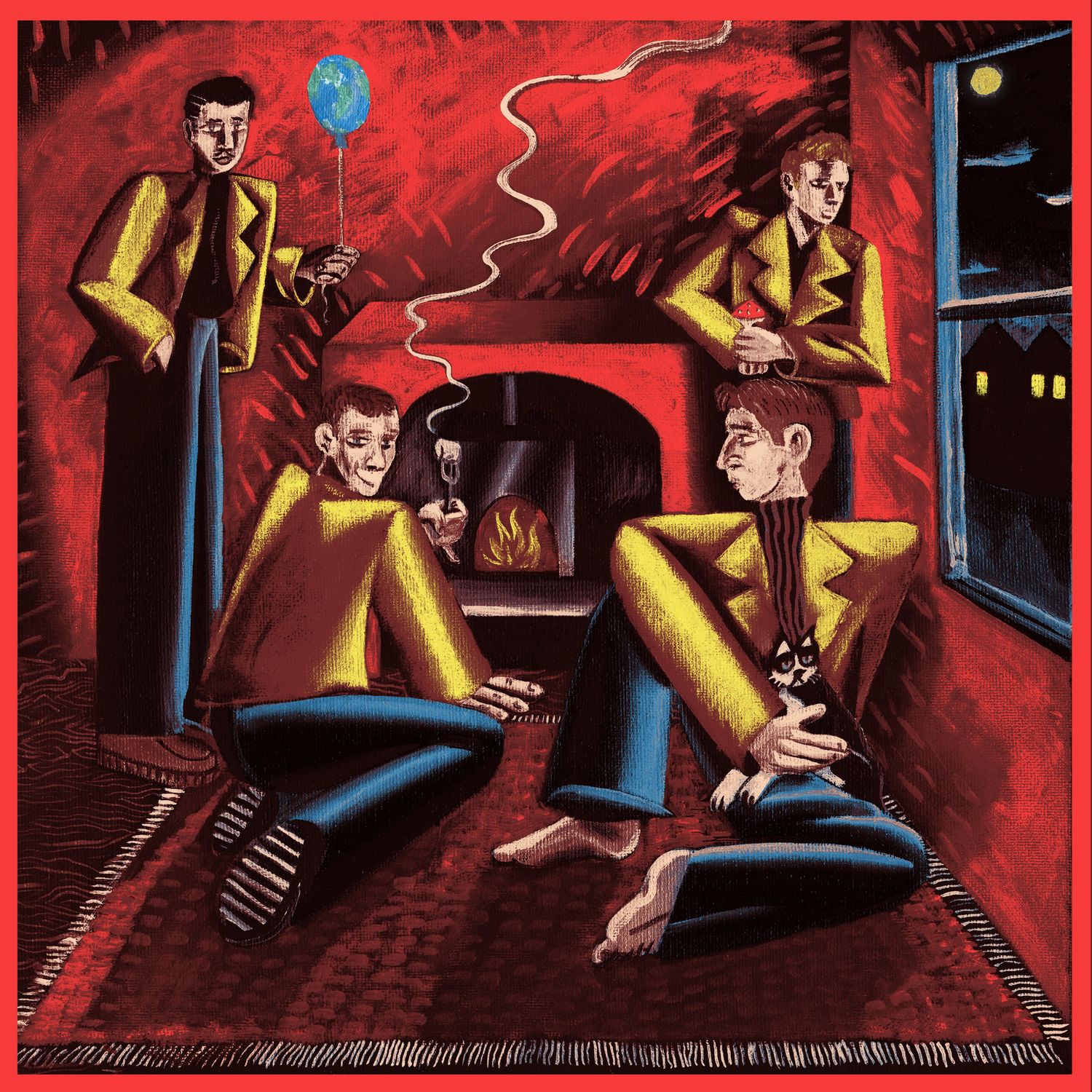Although they’re only new releasing their debut album, Horsey have been around a little longer than most of their contemporaries in the South London art rock scene. Having put out their first tunes in 2017, they have since been outshone by the explosions of their younger peers in black midi, Black Country, New Road and Squid, and seemed destined to become a footnote in the history books. However, when they returned in 2020 with the standalone single “Bread & Butter”, there was a new fidelity to their sound, and seemingly a new determination to leave a mark, which they duly do with Debonair.
With all four members now in or approaching their 30s, it’s a welcome surprise that their childish little brother demeanour hasn’t yet disappeared – and in fact is the lifeblood of Debonair. A good deal of that youthfulness can probably be accredited to the fact that principal songwriters Theo McCabe and Jacob Read (also of Jerkcurb) have been friends since childhood, and therefore have a thick book of shared references and language. And, Debonair proves to be an album that deals with youthful manliness; the album cover perfectly captures this as it depicts the band as wannabe suave sophisticated types, but still each clutching their childhood comforters.
Debonair’s opening track “Sippy Cup” takes us right back to their toddler years, Horsey evoking the impact of a sugar injection on a child’s bloodstream with McCabe yelping about “slipping through slime” over helter skelter keys, rambunctious drums, twisting sax and herky-jerky indie mania. It’s a breathless start. From that point Horsey sing about (slightly) more mature topics of love and lust, but there’s always an air of adolescence or immaturity to it, either in the way their feelings become unbearably overwhelming or simply in the way they view their bodies’ grotesqueness. These feelings are accentuated and underscored by Horsey’s tendency to make their songs lumpy with unpredictable instrumental diversions and deranged metaphors for their outsized emotions.
“Arms and Legs” and “Everyone’s Tongue” were initially released on their debut 2017 outing, but the new versions here are infinitely more produced, and are a clear sign of the new intent Horsey have on this album. The guitar is more muscular, the keys twinkle and chime with resonant glee, and a bunch of layers of atmospheric noise and shouts gives them more momentum and depth. This new attention to detail emphasises the wild dynamics of “Arms and Legs”, giving the whole thing a warped fun-house-mirror type feeling that chimes with the jealousy of the lyrics. “Everyone’s Tongue” is similarly rejuvenated, the guitar sounding menacing as McCabe recounts being shat on by a Frenchman, before Horsey shift into power punk mode to animate his escape from his cannibalistic friends.
As unhinged as they can be in their energetic tracks, sometimes it’s the slower ones that are the most unsuspectingly sinister. “Underground” is a beautiful torch song sung by Read, paying tribute to a partner who doesn’t do anything, because he’s, well, under the ground, of course. The album’s slow-burning two-parter “Wharf” starts with gorgeous washes of guitar like moonlight on a lake, but this image is soon disrupted as it floats into “Wharf (ii)” and McCabe announces “I’ve puked on all my ties / Ruined my disguise.” Horsey almost seem to be making fun of his haphazard romantic instincts as they buffet him with guitar and sail into a James Bond-esque instrumental that is far more slick than his bumbling persona. Debonair concludes with the atmospheric “Seahorse”, which features their old friend (and brother of bassist Jack Marshall) King Krule. His unmistakable, rasping voice and powerfully oblique poetry practically makes Horsey into the guest feature on their own song, but when you’ve got access to a talent like that and an album that can easily contain yet another style shift, why wouldn’t you?
While many might be thrown off by Horsey’s severe sound switches and simply bonkers approach to lyricism, there’s an easy access point in “Lagoon”, the crystallisation of their unkempt stylings into a perfect pop moment. It finds McCabe adopting something like a croon while dreaming of a romantic escape with a partner who has a “body like two month old balloon”, and the unusual romance quickly captures the imagination. Horsey then send it spiralling to the horizon with a power pop chorus of “we could go anywhere / we could go anywhere at all” punctuated by a jazz-inflected piano melody and punchy percussion from George Bass (who is perhaps the undersung hero of the album, as he manages to hold this melange of madness together).
“Lagoon” is such an irresistible smash that it’s tempting to say that they should try to follow that formula going forth, but for Horsey to try and adhere to any kind of pattern would be completely removing the soul of their sound. They probably couldn’t repeat it if they tried anyway; they’re so unpredictable that you can imagine them listening back to their own songs and thinking ‘where did that come from?’. That is the joy and the lunacy of Horsey, and where it will take them next not even they know.

